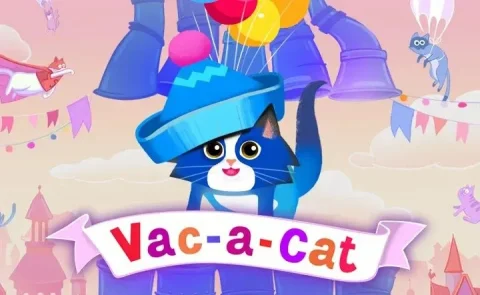



As a cat parent, you want the best for your feline friend. You provide them with everything they need, from healthy food to comfortable bedding.
 However, there's one crucial aspect of cat care that you might be overlooking: vaccinations. Vaccinating your cat is vital for protecting them from a range of potentially deadly diseases, and it's a responsibility that every cat owner should take seriously. In this blog article, we'll explore why vaccinating your cat is so important, the diseases that they need to be protected against, and how you can ensure that your feline friend is up-to-date with their vaccinations. Then you can enjoy free slots at Gambino Slots social casino like Vac-a-Cat!
However, there's one crucial aspect of cat care that you might be overlooking: vaccinations. Vaccinating your cat is vital for protecting them from a range of potentially deadly diseases, and it's a responsibility that every cat owner should take seriously. In this blog article, we'll explore why vaccinating your cat is so important, the diseases that they need to be protected against, and how you can ensure that your feline friend is up-to-date with their vaccinations. Then you can enjoy free slots at Gambino Slots social casino like Vac-a-Cat!
Vaccinating your cat is a crucial step in ensuring their overall health and well-being. Vaccines help protect your cat from a variety of diseases that can be life-threatening. By vaccinating your cat, you not only protect them, but you also help to prevent the spread of these diseases to other cats in your community. In addition to protecting your cat's health, vaccinating your cat can also save you money in the long run. The cost of treating a cat with a preventable disease can be much higher than the cost of vaccinating them. Vaccines are a small investment that can pay off big in the long run. Finally, vaccinating your cat is not only important for their health, but it's also required by law in many places. Many cities and states require cats to be vaccinated against certain diseases, such as rabies. Failure to vaccinate your cat can result in fines or other penalties.
There are several common feline diseases that can be prevented by vaccination. Some of these diseases can be transmitted to humans, making vaccination even more critical. Here are some of the most common feline diseases that your cat should be vaccinated against.
Feline Panleukopenia is also known as feline distemper. It is a highly contagious viral disease that affects the cat's gastrointestinal and immune systems. Symptoms of feline panleukopenia include vomiting, diarrhea, and dehydration. The disease can be fatal, especially in young kittens.
Feline Calicivirus is a respiratory infection that can cause fever, sneezing, and eye discharge. In severe cases, it can cause pneumonia. The disease is highly contagious and can spread quickly in multi-cat households.
Feline Leukemia Virus (FeLV) is a viral disease that affects the cat's immune system. It is spread through bodily fluids, such as saliva, urine, and blood. Cats with FeLV are more susceptible to other infections and may develop cancer. The disease can be fatal.
Rabies is a viral disease that affects the nervous system. It can be transmitted to humans through bites or scratches from an infected animal. Rabies is almost always fatal, making vaccination against it crucial.
There are two primary types of feline vaccines: core vaccines and non-core vaccines. Core vaccines are recommended for all cats, while non-core vaccines are recommended only for cats at risk of a particular disease.
Core vaccines protect against diseases that are widespread and can be life-threatening. The American Association of Feline Practitioners (AAFP) recommends the following core vaccines for all cats:
Non-core vaccines are recommended only for cats at risk of a particular disease. These vaccines are not necessary for all cats, and your veterinarian will help you determine which vaccines your cat needs. Some examples of non-core vaccines include:
The vaccination schedule for cats will depend on their age and vaccination history. Kittens should receive their first set of vaccinations at around 6 to 8 weeks old. They will need a series of vaccinations over the next few months to build immunity. Adult cats should receive booster shots annually or every three years, depending on the vaccine. Your veterinarian will help you determine the appropriate vaccination schedule for your cat.
Like any medical procedure, there are risks and side effects associated with feline vaccinations. However, the risks are generally minimal compared to the benefits of vaccination. Some cats may experience mild side effects, such as fever, lethargy, or a reduced appetite. Rarely, more severe side effects may occur, such as an allergic reaction. If you are concerned about the risks of vaccination, talk to your veterinarian. They can help you understand the risks and benefits and determine the best vaccination plan for your cat.
Preparing your cat for vaccinations can help reduce their stress and anxiety. Here are some tips to help make the vaccination process smoother for your cat:
The cost of feline vaccinations can vary depending on your location and the type of vaccine. Core vaccines are generally less expensive than non-core vaccines. However, the cost of vaccination is small compared to the cost of treating a preventable disease. You may also be able to find low-cost vaccination clinics in your area. Contact your local animal shelter or humane society for more information.
If you are concerned about the risks associated with traditional vaccinations, there are alternatives available. Some cat owners choose to use homeopathic as an alternative to traditional vaccinations. However, there is little scientific evidence to support the effectiveness of these alternatives. Talk to your veterinarian before deciding on an alternative vaccination plan.
Vaccinating your cat is essential for protecting their health and well-being. By vaccinating your cat, you are not only protecting them, but you are also helping to prevent the spread of disease to other cats in your community. Talk to your veterinarian about the appropriate vaccination schedule for your cat and ensure that they are up-to-date with their vaccinations. Remember, prevention is always better than cure.